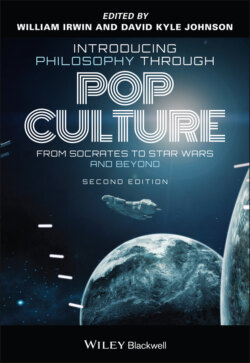Читать книгу Introducing Philosophy Through Pop Culture - Группа авторов - Страница 17
Cartman Gets a Banal Probe
ОглавлениеOne of the most significant philosophical reflections on evil in the twentieth century is Hannah Arendt's Eichmann in Jerusalem: A Report on the Banality of Evil, a study of the trial of Adolf Eichmann for his role in the deportations of millions of European Jews to concentration camps during the Jewish Holocaust. Eichmann just followed the law of the land, whatever it happened to be, and when Hitler was making the laws, Eichmann simply carried them out.5 In the words of Arendt, Eichmann was an unreflective person, unable to think for himself and definitely unable “to think from the standpoint of somebody else.”6 What was really monstrous about Eichmann was not his vicious cruelty, but rather the way that he was not that different from so many Germans who, under Hitler, accepted and supported laws that were obviously evil and believed that they were doing what was right. Eichmann's banality – the fact that there is nothing distinctive or exceptional about him – is precisely what makes him evil. He was one of the “crowd” who didn't walk to the beat of a different drummer and didn't rock the boat. He embodied complicit citizenship under a dictatorship, which speaks for its subjects and, thus, cuts off their reflective and critical thought.
Thoughtlessness leads to evil, as Arendt says, because it doesn't let us see things from others' perspectives. By blindly following orders, Eichmann didn't think about what his actions were doing to others, or even what they were doing to himself. By saying he was “following the law” and “doing his duty,” he ignored how his actions sent millions to their deaths and, despite his protests, made him a murderer. Thinking, according to Arendt, requires taking another's standpoint, reflecting on how you might be harming others, and asking if you can live with what you are doing.
While the adults in South Park blindly follow the latest fad, or what they are told, it is the children who bring out the absurdity and potential harm that lurks in such thoughtlessness. To be more accurate, it's usually Kyle and Stan who are the reflective ones, while Cartman's mind is as empty as the Cheesy Poofs he devours daily. He is often sadistic, cruel, and evil. Like Eichmann, Cartman is probably evil because, when it comes to “authoritah,” he lacks reflection and critical analysis. (And like Eichmann, he has a Nazi uniform that he has sported on occasion). Cartman sings the Cheesy Poofs song so well because all he can do is imitate what he hears on television. His evil is an imitation of the evil characters of our culture, as prepackaged as his afternoon snacks. Cartman consumes evil and imitates it as blindly and thoughtlessly as Eichmann – even when feeding Scott Tenorman his own parents (like Medea), trying to kill Kyle and Stan on a lake (like Fredo), or torturing Muslims with his farts (like Jack Bauer) to find the “snuke.” Most importantly, because of this thoughtlessness, Cartman is unable to see things from anyone else's viewpoint (as illustrated most clearly in his manipulation of his mother). As Arendt says, such thoughtlessness is precisely what allows evil to emerge in modern society, and Cartman's mindless consumption is as thoughtless as it gets.
